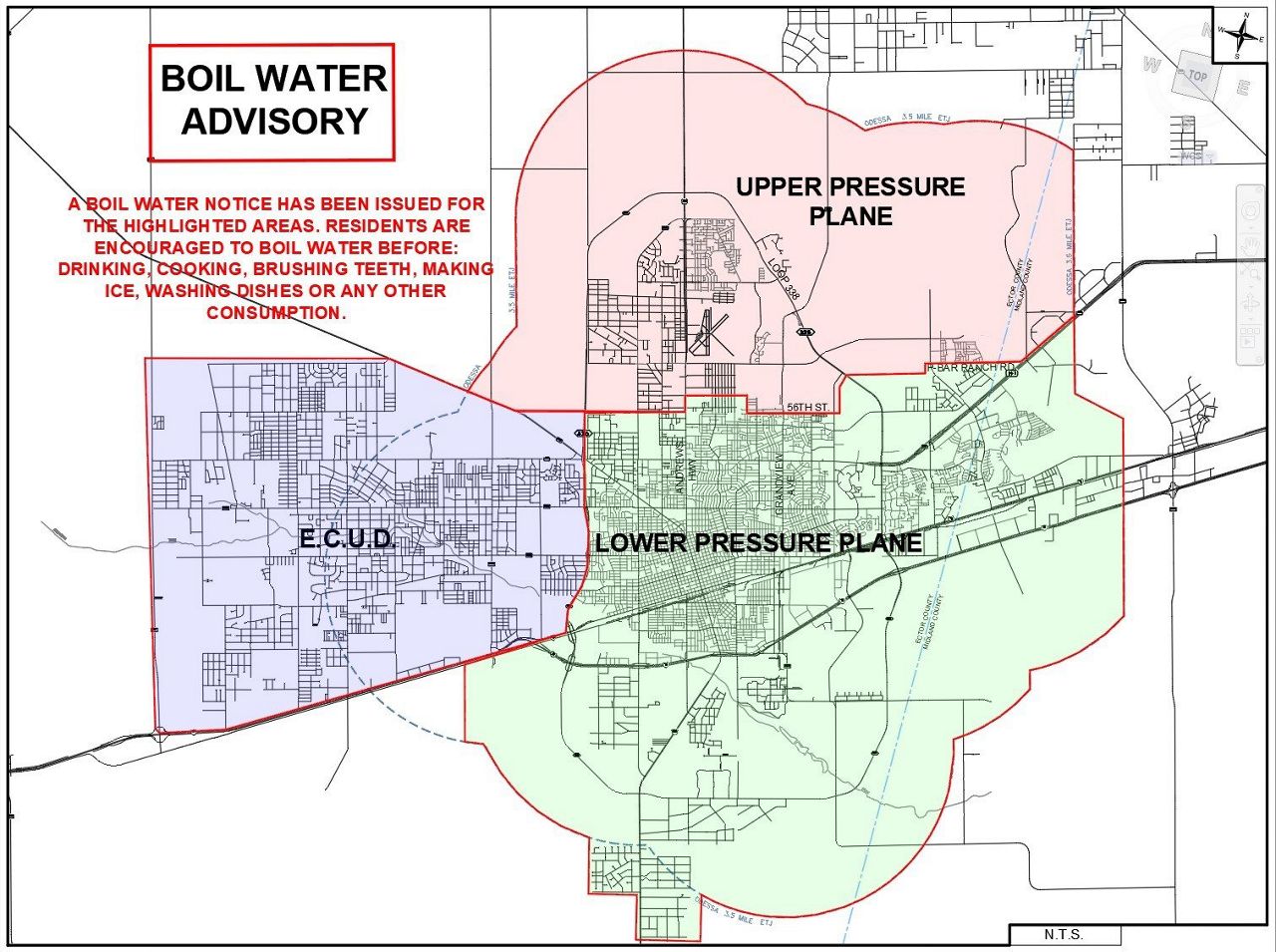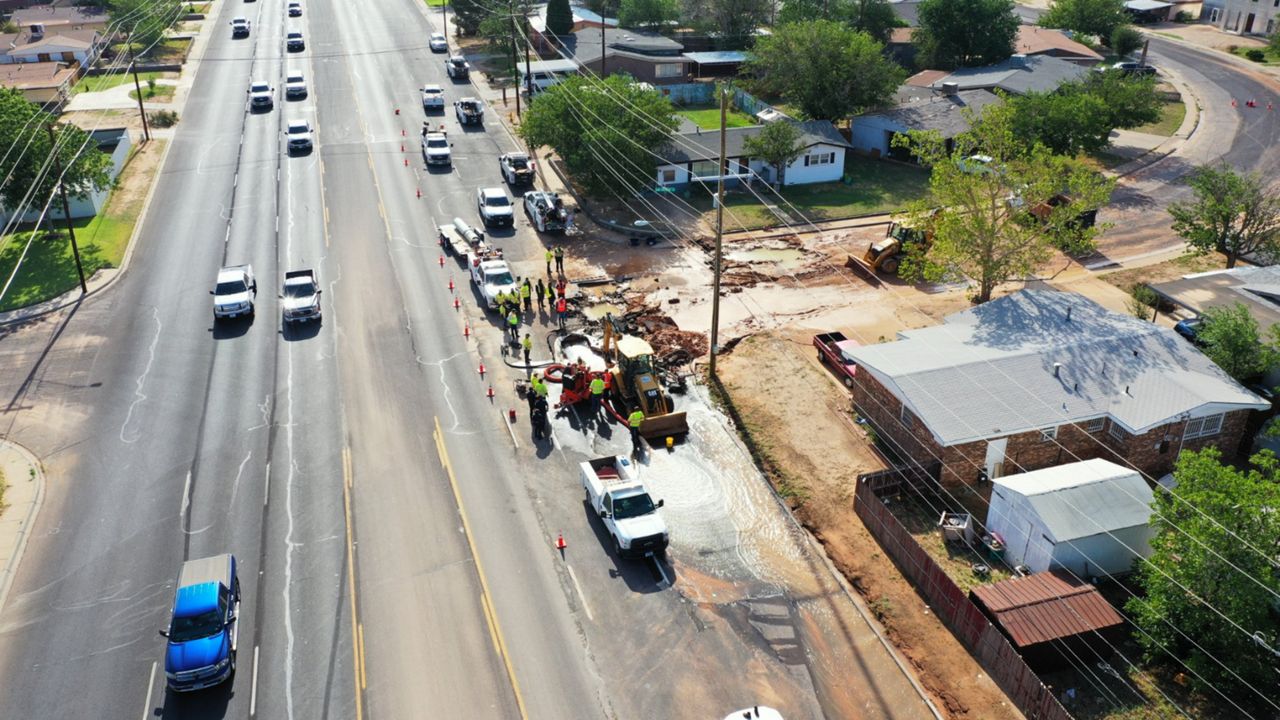ODESSA, Texas — Residents of the West Texas city of Odessa improvised emergency water supplies after a water system outage left them high and dry for days amid scorching heat, even as utility crews scrambled Wednesday to restore normal service.
Odessa Mayor Javier Joven declared a state of emergency and issued a boil-water notice Monday for the system’s 165,000 customers who still had water, effective until further notice.

The city said taps in 165,000 homes and businesses lost pressure or went completely dry after a 24-inch (61-centimeter) main broke Monday afternoon. Odessa's water treatment plant was back online by about 8 a.m. Wednesday, but a “recharging” process was taking place during which workers slowly add water back into the system to ensure there are no more leaks.
“I want to assure you that we’re utilizing every resource at our disposal to ensure that we get this community back to the way it was before this massive line break,” City Manager Michael Marrero said in a Facebook video posted Wednesday afternoon.
Public Works Director Thomas Kerr said a small leak had been detected Wednesday afternoon, which he described as manageable. He said he hoped the system would be fully recharged by Thursday but added that residents should continue to boil their tap water to kill any bacteria before consuming it. The boil-water notice was likely to continue until Friday, he said.
“As we have never done this before, (restarting) an entire system like this, we are making those predictions based on a good guess,” said city Utilities Director Thomas Kerr.
Water tankers were placed strategically around the city to respond to any fires, said Deputy City Manager Phillip Urrutia.
“It’s an aging infrastructure that we’re seeing. It’s a cast iron pipe, and so those are typically more susceptible to breaks than other new technologies like PVC pipe that’s going in the ground,” he said.
Governor Abbott ordered state agencies on Tuesday to help out in response to the main water line failure. He tweeted the following response.
The Texas Division of Emergency Management said it was shipping truckloads of drinking water while city crews expedite repairs to the main. The Texas Commission on Environmental Quality has staff standing by in Odessa to test water quality, according to the agency's statement.
Temperatures approached 100 degrees Fahrenheit (38 degrees Celsius) in Odessa Wednesday as Texas and much of the United States faced extremely hot and humid conditions. And while the city typically sees hot weather in June, the timing of the break made dealing with this week’s heat more difficult.
Resident Nikki Friday told The Associated Press that the city was providing bottled drinking water and that people with wells were offering neighbors water from hoses. She also said tanker trucks had been parked around town to fill buckets with water.
"Drinking water has not been an issue,” Friday said. “We just need water to return to our daily lives and within the community.”
Lifelong Odessa resident Lynda Wright said water service had not been lost across the city in the more than five decades that she has lived there. She said she picked up water and ice from Midland, a 15-minute drive from her home.
Wright said she had drinkable water stored in jugs for washing hands and brushing teeth, and that her family hooked her house up to a well on her property to provide water to flush toilets.
“We just dropped a hose in the (water) line,” she said.
Wright said she noticed water began running again around noon but that the pressure did not immediately return to regular strength.
The city, which is located about 330 miles (530 kilometers) west of Dallas, planned to distribute water to residents at Ector County Coliseum as well as deliver water to nursing homes. Water tankers were placed strategically around the city to respond to any fires, said Deputy City Manager Phillip Urrutia.
“It’s an aging infrastructure that we’re seeing. It’s a cast iron pipe, and so those are typically more susceptible to breaks than other new technologies like PVC pipe that’s going in the ground,” he said.
Wright said the city must act to prevent another water emergency.
“I just hope that they kind of learned we need to get in there, we need to check these lines and repair those that show signs of age and wear and tear,” she said.



